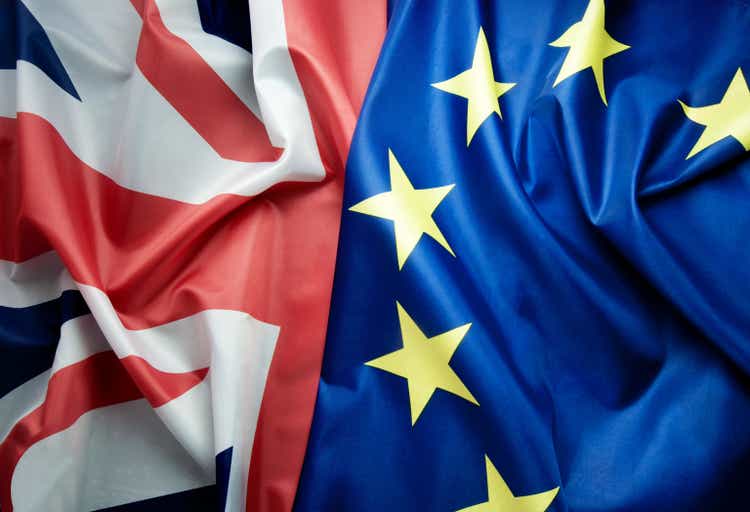CharlieAJA/iStock via Getty Images
Within the last twenty four hours the attention of much of the world has turned to the United Kingdom and the end of the remarkable seventy-year reign of Queen Elizabeth II. The UK gained a new sovereign head of state, King Charles III, just days after gaining a new prime minister, Liz Truss the first, who will face a mountain of problems as she settles into Number 10 Downing Street.
On the other side of the English Channel, European Commission president Ursula van der Leyen is trying to win the votes of EU member countries for a cap on gas prices targeted at Russia, which proposal is meeting with stiff resistance from some of those countries, notably Italy, which reasonably fear the consequences of Vladimir Putin turning off the gas taps entirely as the cold weather season approaches.
All in all, it seems like a good time to revisit one of our ongoing themes of this year, which that however tough the economic situation might be here at home, it is better here than there. We continue to believe that large cap US equities should be the outsize bedrock asset on the growth side of long-term portfolios.
The Truss Dilemma
Let’s start with the UK. In the coming weeks we will all have a chance to see the British at their best, with the pomp and circumstance that will accompany the period of mourning for the late, and much beloved, Queen Elizabeth. But the visual grandeur will not do anything to lessen the squeeze on living standards hitting all British households as soaring energy prices and a now double-digit inflation rate far outpace wage growth.
Household energy bills are currently set to rise 80 percent between now and the end of the year, with further increases expected in the early months of 2023. Wholesale natural gas prices are fifteen times recent historical averages, leading most economists to predict general inflation levels of 14 or 15 percent by January next year.
The urgency of spiraling energy costs has made this Issue Number One for the incoming prime minister. She has given the broad outline of a plan (to be revealed in more detail next week) to freeze household energy bills for the next two years while providing additional relief on energy prices to businesses. Truss asserts that in addition to soothing household fears over upcoming energy bills, this plan will have the effect of reducing inflation.
That view is shared by, charitably speaking, very few mainstream economists including those at the Bank of England, who calculate that the Truss plan, whatever the details reveal next week, will cost about £150 billion over the next two years, which will ultimately be highly inflationary and require the bank to raise interest rates by even more than otherwise planned.
The BoE is basing its entire institutional credibility on fighting inflation. That will be an even tougher climb if it has to countenance a massive amount of fiscal expansion from the incoming government.
The EU Dilemma: How Much Leverage?
It’s no secret that Europe has been working for months on reducing its dependence on Russian gas and thus improving its leverage in imposing sanctions to reduce a key source of revenue for Russia as it continues to wage its war against Ukraine.
It has made some headway, with higher supplies from Norway, the North Sea and northern Africa, along with increased LNG imports, offsetting Russia’s dominance as the continent’s principal energy supplier. But it is not clear whether the EU currently has enough leverage to successfully implement a proposed price cap on gas that exclusively targets Russia. This is the proposal backed by EC head van der Leyen and supported by some, though by no means all, EU member states.
A cap on prices specifically targeting Russia would require the assent of all 27 member nations as it would be deemed a sanction applied as a bloc. A more general price cap that does not single out Russia but that would apply to all gas suppliers, which has been proposed as a counter-solution by Italy and Greece among others, would only require a simple majority to go ahead.
In the meantime, Russia appears to have turned off the spigot indefinitely for the NordStream1 pipeline that supplies much of northern Europe’s gas from Russia. Putin has threatened a complete shutdown, which would involve the other two main pipelines through Ukraine and the Black Sea that for the moment remain open. Despite better than expected replenishing of gas storage facilities, northern Europe especially still faces significant potential shortfalls in energy supplies as winter approaches.
The energy crisis, of course, is not the only issue affecting Europe’s economy which, like others around the world, is wrestling with the negative effects of persistent global supply chain problems, China’s faltering economy and a growing number of extreme climate-related events.
But the energy dilemma that is front and center for both the UK and the EU is of several magnitudes more severe than the impact higher gas prices have been having on us here in the US. It is one of the defining factors in our ongoing view that things are better here than there, a view which will continue to influence our portfolio allocation decisions.
Editor’s Note: The summary bullets for this article were chosen by Seeking Alpha editors.


Be the first to comment